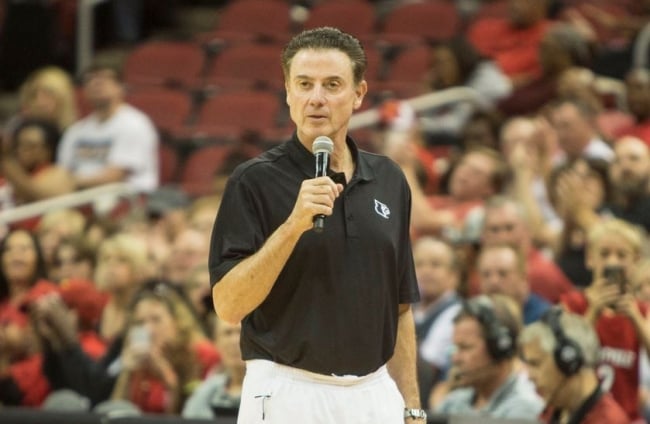You have /5 articles left.
Sign up for a free account or log in.

Rick Pitino, Louisville head men's basketball coach
University of Louisville
The University of Louisville committed four major National Collegiate Athletic Association violations when a former men’s basketball assistant paid an escort service to provide strip shows and sex for recruits and other players, the NCAA stated in a notice of allegations sent to the university Thursday. The Level I violations charge the program’s head coach, Rick Pitino, with “failure to monitor” his employee, a serious allegation that could result in a suspension for the coach.
When the scandal first became public last year -- after the head of the escort service published a tell-all book -- the assistant at the center of the allegations, Andre McGee, said the claims were untrue. The university avoided confirming or denying the charges at first and backed Pitino when he said he was unaware of the misconduct. An internal university investigation and, now, an NCAA investigation have confirmed that the parties with the escorts did in fact happen, but Louisville officials maintain that Pitino, and the university at large, should not be punished any further.
“The NCAA does not allege a ‘lack of institutional control’ at Louisville, a very severe allegation,” the university said in a statement. “The NCAA does not allege that Coach Pitino failed to ‘promote an atmosphere of compliance,’ a serious allegation. The [notice of allegations] does contain a narrower allegation -- which we will dispute -- that Coach Pitino failed to demonstrate that he monitored Mr. McGee. We believe that Mr. McGee acted furtively and note that the NOA does not indicate that any other university employee besides Mr. McGee had knowledge of these activities. We are confident in Coach Pitino and we know he is and always has been committed to NCAA compliance.”
That the university continues to defend Pitino has angered critics of the athletics department, including some faculty members at Louisville. And experts on NCAA rules say that, while Louisville plans on fighting the charge against Pitino, the university already dodged several bullets. Other institutions that have run afoul of NCAA rules have also argued that knowledge of misconduct was limited to one or two staff members. Unlike Louisville, those programs were still hit with lack of institutional control and failure to promote an atmosphere of compliance.
Mark Nagel, associate director of the University of South Carolina’s College Sport Research Institute, said the bizarreness of this case may have shielded the university from further violations.
“It is possible that the NCAA is saying that this type of action was unlikely to be predicted by the various compliance officials on campus,” Nagel said. “It may be that few, if anyone, on a typical campus would expect this type of behavior and so there should not have been an expectation of this happening and therefore a need to have a structure, beyond the coaches, in place to prevent it. Obviously, the standard for future cases may now be different because other schools should see what happened at Louisville and should better understand this is an area that needs tighter controls.”
Alternatively, Nagel added, "it could just be the NCAA administering allegations in a haphazard manner." While it's true that paying for escorts is not a typical NCAA rules violation, it is also not unprecedented.
Whether Pitino or any other officials knew of the parties is irrelevant as far as the NCAA’s failure-to-monitor rules are concerned. In 2014, the association revised its rules to hold coaches more accountable for all violations within their programs even if they were unaware of the misconduct. “An institution's head coach is presumed to be responsible for the actions of all institutional staff members who report, directly or indirectly, to the head coach,” the revised rule states.
Pitino’s contract -- which runs through 2026 -- contains similar language. The coach is required to “diligently supervise compliance of assistant coaches and any other employees for which [he] is administratively responsible.” The dormitory in which the parties took place is also under Pitino’s purview. The building is designated for athletes and was built at his request.
The residence hall is named after the coach’s brother-in-law, who died in the Sept. 11 terrorist attacks. In widely criticized remarks made during a news conference Thursday, Pitino invoked Sept. 11 while denying his involvement in the prostitution scandal. “Fifteen-plus years ago, a plane went through the World Trade Center, and it altered the life of my family completely,” Pitino said, adding that he was not guilty of failing to monitor his employees, but was “guilty of trusting someone.”
The former escort, Katina Powell, said she was paid by McGee, the team's former graduate assistant and director of basketball operations, to provide recruits with strip shows and sex during overnight visits in the dormitory. Powell said she was given about $10,000 by McGee for supplying dancers -- including her own teenage daughters -- for more than two dozen parties during a four-year period. In one instance, McGee allegedly offered the escort basketball tickets and a bottle of whiskey signed by Pitino.
The NCAA’s report largely matches Powell’s account. McGee, the association alleges, spent at least $5,400 on “impermissible inducements, offers and/or extra benefits in the form of adult entertainment” for at least 17 basketball recruits and players, as well as two coaches and a prospective athlete’s friend. The notice of allegations refers to these benefits as striptease shows and sex acts.
McGee resigned a year ago from his position as an assistant basketball coach at the University of Missouri at Kansas City, where he moved before the scandal broke, but maintained his innocence. “The university deserves a full-time assistant coach and I am not able to provide that to the basketball team while the false allegations against me are being investigated,” McGee stated. McGee did not cooperate with the NCAA investigation.
Throughout the process, the university has defended the coach, and Pitino has denied any knowledge of the parties. “I will not resign and let you down,” Pitino wrote in a blog post last year. “Someday I will walk away in celebration of many memorable years, but that time is not now. I do not fight these accusations by others, but rather turn the other cheek. Couldn’t do it at 33, but at 63 it’s the wise thing to do. Let’s let the investigators do their job and we will play basketball.”
In the post, he also referenced Pope Francis’s recent visit to the United States, saying the pope would frequently answer controversial questions with the phrase “we will let God judge.” It is advice Pitino said Louisville students and fans should remember as the investigation continues. “Let’s not try to justify,” he wrote, “but let the Lord judge.”
Earlier this year, the University of Louisville self-imposed a series of sanctions, including a postseason ban, on the basketball program. In its statement Thursday, the university reiterated that it had already taken the “appropriate punitive and corrective actions.”
The NCAA does not comment on ongoing infractions cases. The university now has 90 days to respond to the notice of allegations.
Nancy Theriot, a professor and chair of women’s and gender studies at Louisville, said the university’s continued defense of the coach and the program suggests that officials are not taking the underlying issues of the charges seriously enough. Theriot said the use of dancers and escorts is an extreme example of a larger and troubling tradition in which colleges woo recruits with attractive young women.
In 2013, Sports Illustrated reported that Oklahoma State University’s football program used a group of women to entice recruits. Officially the group, called Orange Pride, was meant to show visiting high school athletes around campus. Unofficially, according to Sports Illustrated, some of the women were having sex with the players. “There's no other way a female can convince you to come play football at a school besides sex,” one former OSU football player said. “The idea was to get [recruits] to think that if they came to Oklahoma State, it was gonna be like that all the time.”
The NCAA ruled that the allegations were "unfounded" but found the university in violation of "engaging in impermissible hosting activities" for using Orange Pride in recruiting events. Such recruitment groups, or hostess programs, are not uncommon, despite the NCAA having banned “gender-based student hosting groups.” Louisville has used such programs in the past, too.
In 2007, the University of Colorado at Boulder reached a settlement with two women who said they were gang-raped at a party for recruits. The alleged assaults stemmed from a larger recruiting scandal that included strippers hired to entertain recruits and allegations that hostesses were being paid to sleep with the athletes. Scandals involving hostess programs have also occurred at Arizona State University, the University of Oregon, the University of Tennessee and Vanderbilt University.
“I think the university's challenge is an attempt to protect a coach that should have been monitoring his team and employees,” Theriot said. “The coach should be held accountable for monitoring his team and employees. Isn’t this part of why he gets such an outrageous salary? And Louisville challenging this sends a message that the university does not take this seriously. The student athletes are fair game for sanctions, but not the coach? Please!”




